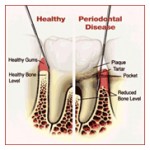Image courtesy of renjith krishnan at FreeDigitalPhotos.net
Gum disease or periodontal disease is a chronic inflammation and infection of the gums that destroys the supporting bone and tissue around your teeth. It is the major cause of adult tooth loss, bad breath, and affects three out of four people after the age of 35. It provides a direct path for bacteria to enter your blood stream on a daily basis.

What causes gum disease throughout the mouth?
The most common causes are an overabundance of bacteria in the mouth, a weak immune system, a diet low in nutrients, a medical condition, and in some cases a wide variety of synthetic medicine. Our program will address each of these issues.
What do blood tests reveal about people with gum disease?
Gum disease can elevate the risk factors for heart disease and
diabetes: cholesterol, hs-C-Reactive Protein (hs-CRP) and
glucose levels. We screen for these before and after your
periodontal treatment. If they are elevated after treatment
there is a possibility of an underlying medical condition. Our
goal is to make sure that your oral condition is NOT
elevating these blood chemistries so your physician can make
an accurate diagnosis. Heart attack, stroke, and diabetes are
among the biggest heath issues we have today. Research shows that a 10% decrease in total cholesterol
can reduce the incidence of heart disease by as much as 30%. Many times we see a decrease in
cholesterol after periodontal treatment.

High sensitivity C-Reactive protein (hs-CRP) can become elevated when there is inflammation present such as inside your mouth or inside the blood vessels leading to your heart. This test can detect elevated hs-CRP on apparently healthy individuals that have no symptoms. Research shows that 50% of men and 64% of women that die suddenly from heart disease, had no previous symptoms, and have normal cholesterol. Therefore, leading medical centers use hs-CRP as one of the tests used in determining your risk of heart disease. Many times we see a significant decrease in hs-CRP after periodontal treatment.
Research shows that glucose levels rise and are hard to control in diabetics if they have periodontal disease. Physicians can better determine the proper amount of medication when periodontal disease is not present. Occasionally blood glucose levels significantly reduce after periodontal treatment.
What about my physician?
We encourage follow up care with your physician. Appropriate modification of risk factors (including high blood pressure, smoking, physical inactivity, obesity, and diet) is also necessary for stroke, heart attack, and diabetes prevention. Our screenings cannot detect all forms of cardiovascular disease and do not result in a medical diagnosis or replace regular contact and follow up with your physician.
Read the Original Article by Dr. Ferullo here.
